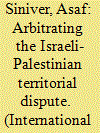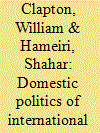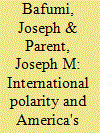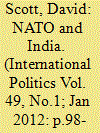| Srl | Item |
| 1 |
ID:
110206


|
|
|
|
|
| Publication |
2012.
|
| Summary/Abstract |
This article presents the case for arbitrating the territorial dispute over the West Bank between Israel and the Palestinian Authority. After nearly two decades of intense intermediary activity but with still no signs of progress, and against the inability of the parties themselves to move towards reconciliation, the article argues that as a method of conflict resolution, mediation has exhausted its primary objective - namely the establishing of direct channels of communication between the disputants - and it is now time to examine alternative methods to conflict resolution. The article debunks the myths surrounding the success of American mediation in the conflict, and uses the historical case of the Taba arbitration between Israel and Egypt to demonstrate under what terms the arbitration of the West Bank dispute might be presented, while taking into consideration its advantages and drawbacks compared with the more established method of mediation in this conflict.
|
|
|
|
|
|
|
|
|
|
|
|
|
|
|
|
| 2 |
ID:
110203


|
|
|
|
|
| Publication |
2012.
|
| Summary/Abstract |
Recent work has identified new hierarchical relationships within international society. However, few scholars have provided a satisfactory account of what informs their formation, reproduction or constitutional effects for international society. We argue that underpinning the emergence of a more hierarchical international society is a new social logic of risk, which constructs illiberal and/or fragile states as potentially dangerous sites of instability and disorder that pose particular security risks for Western states. We proceed to argue that such risk-based hierarchies are transformative of both inter-state and intra-state relations, by stripping equal political agency from 'risky' actors within and without the state. We demonstrate these claims by drawing on examples of international state building in Southeast Asia and the Southwest Pacific.
|
|
|
|
|
|
|
|
|
|
|
|
|
|
|
|
| 3 |
ID:
110202


|
|
|
|
|
| Publication |
2012.
|
| Summary/Abstract |
Why has the term humanitarian intervention experienced such a meteoric rise into the core of academic as well as public political discourse? An investigation of classical theory shows that the use of force to help citizens of other states has been regularly contemplated and practiced in the past. The concept of humanitarian intervention therefore does not describe new policies; instead it serves to hide the political nature of these policies today and functions as a 'doctrinal advance guard' for a new international order. It is the political conjuncture that requires a new name for old policies and its radical political content that explains the timing, speed and impact of this term.
|
|
|
|
|
|
|
|
|
|
|
|
|
|
|
|
| 4 |
ID:
110201


|
|
|
|
|
| Publication |
2012.
|
| Summary/Abstract |
There is a growing consensus that the United States is undergoing a period of political polarization, particularly among elites. The causes of this polarization remain under-researched. We argue that shifts in the international distribution of power influence America's polarization. To demonstrate the argument, this article analyzes changes in power and polarization quantitatively and qualitatively from 1945 to 2005. A key finding is that greater relative power on the world stage substantially increases polarization and some of its correlates, like income inequality. The argument also measures the extent of international influence on domestic polarization and makes novel predictions on when and why polarization will fall.
|
|
|
|
|
|
|
|
|
|
|
|
|
|
|
|
| 5 |
ID:
110205


|
|
|
|
|
| Publication |
2012.
|
| Summary/Abstract |
In this article, I argue that after having experienced a distinctly cool relationship throughout most of the post-war period and for the 10 years following the end of the Cold War, India and North Atlantic Organization (NATO) are now gradually moving towards each other. Indeed, during the past decade, NATO's 'out-of-area' operations have taken it eastwards from the Mediterranean, while India's 'extended neighbourhood' framework has brought it westwards from the Indian subcontinent. This has created a geopolitical overlap between these two actors, most notably in Afghanistan but also elsewhere in the Indian Ocean. Common advocacy of liberal democracy and overt concerns over jihadist destabilization have brought these two actors together. In NATO's post-Cold War search for relevance and India's post-Soviet search for partners, they have found each other. Unstated potential concerns over China are also a feature in this strategic convergence. However, while NATO has adopted a flexible range of 'Partnership' frameworks, India's sensitivity on retaining 'strategic autonomy' will limit their cooperation to informal ad hoc arrangements.
|
|
|
|
|
|
|
|
|
|
|
|
|
|
|
|
| 6 |
ID:
110204


|
|
|
|
|
| Publication |
2012.
|
| Summary/Abstract |
The article contributes to the growing theoretical scholarship on NATO by developing a theoretical framework that demonstrates the complex relationship between doing and being, identity and action, and knowledge and practice. The article addresses the puzzle that NATO in the past decade has been busier than ever, yet has not managed to construct a strong narrative and maintain ontological security. The article presents a framework, which assumes that ontological security is influenced by identity and narrative construction processes, which are themselves reinforced or undermined by practical action, conceptualized as 'functional action' and 'rhetorical action'. By analyzing NATO's current and past narratives, practices, and action patterns, the article shows that NATO's recent crisis is not just a deeper and more serious crisis because Afghanistan is a difficult mission, but that the depth of the crisis is the result of changes in NATO's established practices and new fundamentally different patterns of action.
|
|
|
|
|
|
|
|
|
|
|
|
|
|
|
|